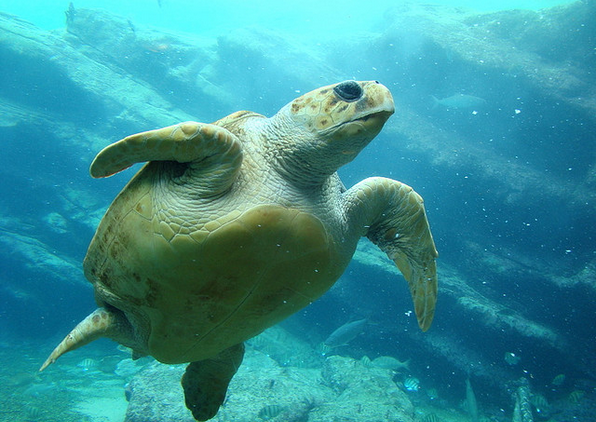A coalition of scientists from University of Wisconsin, Florida Atlantic University and the National Oceanic and Atmospheric Administration have made a discovery: Fat turtles are better swimmers than their thinner counterparts.
The findings were so unexpected, researchers thought they made a mistake at first, Warren Porter, a professor of zoology at UW who worked on this project, said. He teamed up with a former graduate student of his, Peter Dudley, to figure out the mechanics.
In a study funded in part by the UW Foundation and a Disney Worldwide Conservation Fund grant, they found that leaner turtles lose more power while swimming because their flippers come closer together at the bottom of their stroke. Basically, heavier turtles get “better stroke for their buck,” a UW statement said.
Porter has previously created models for land animals, but this is his first model for aquatic animals, he said.
“Swimming animals are very, very difficult to measure experimentally,” Porter said.
Between the scientists from FAU and Porter’s team, their work with these virtual models was innovative.
“[Porter’s team is the first to measure] the forces that act on a swimming animal and the energy the animal must expend to move through the water,” a UW statement said.
Jeanette Wyneken, a biological science professor at FAU, conducted other studies on sea turtles before she teamed up with Porter. She and her students created a tether system that allowed baby leatherback sea turtles to swim freely, while keeping them safe from injuring themselves in their enclosures.
“I was able to provide them with animals that were in good condition, and understand if they were trying to ask the animal to do something that was not within its normal range of behavior,” Wyneken said.
One of Wyneken’s former graduate students, Todd Jones, joined Porter and Dudley in the study. They used the tether system to attach turtles to a machine that measured the force they produced while swimming and the oxygen they consumed, which helps measure their metabolism, Wyneken said.
With help from UW engineering and art departments, the research team built virtual models of swimming turtles and compared them with the real thing to see if they could predict how much energy the turtles were exerting. By evaluating the virtual models, they found that fatter turtles were better at swimming.
The researchers think their findings will be helpful to a wide range of people, from students to conservationists, the statement said.
Because climate change is likely to manipulate the habitats of land and sea animals alike, knowing how they physically interact with the environment is becoming increasingly important. Porter said he want to find answers to questions related to climate change, such as why animals that survived have been able to survive.
Porter said he is participating in a UW competition called Climate Quest, which aims to solve problems associated with climate change, and he is using his recent findings to help.
Currently, he said he is trying to predict how climate change will affect milk production in dairy cows and how to improve production now and farther into the future, in a world with a distinctly different climate than the one we live in now, Porter said.


